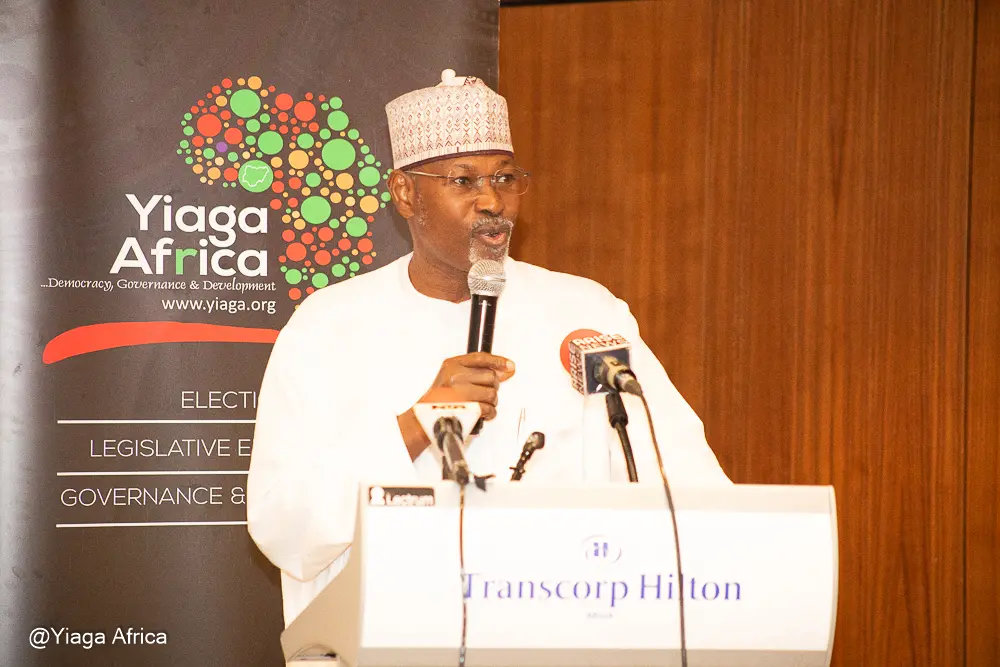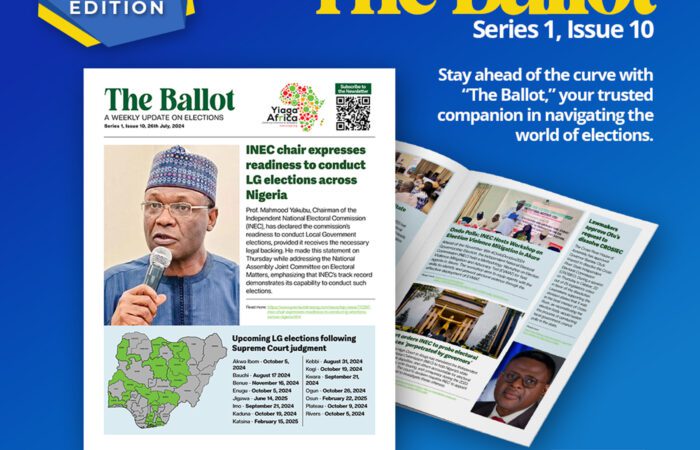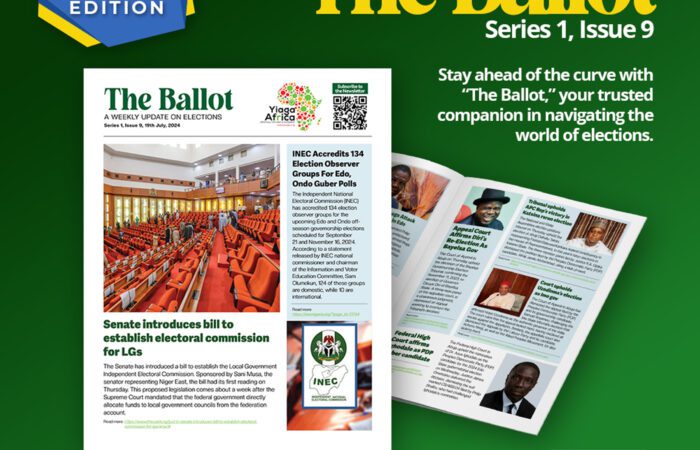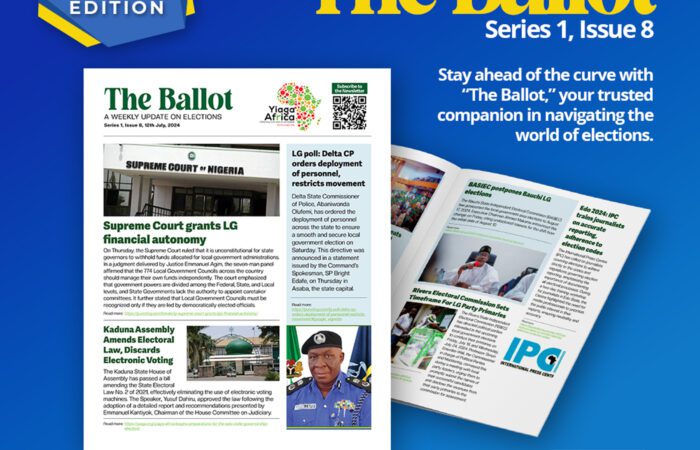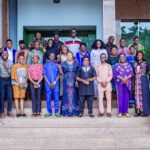Improving the Integrity of Nigeria’s Voter Register
By
Attahiru M. Jega
Professor
Department of Political Science
Bayero University, Kano
Keynote Address presented at the Policy Roundtable on the Theme: Improving the Integrity of Nigeria’s Voter Register,
Organized by Yiaga Africa, on Thursday, 23rd November, 2023, Transcorp Hilton, Abuja
Introduction
As we move from the 2023 general elections to the next election cycle towards 2027 general elections, we need to quite early start the processes of policy, legal and administrative reforms to improve the integrity of elections in Nigeria. And, as we strive to improve the integrity of elections, we must also give priority to finding ways and means of improving the integrity of the register of voters. Many factors combine to deliver electoral integrity, but elections cannot have integrity if the register of voters lacks integrity.
I, therefore, commend Yiaga Africa, the organizers of this round table discussion, for not only recognizing the necessity of improving the integrity of voters register but especially for taking the lead to get critical stakeholders to begin to address their minds to this very important issue.
Nigeria is one of the countries in which citizens who are eligible to vote are required by law to register and obtain a voter’s card, which they present to polling unit officials on the date of an election, and which is verified before they are permitted to cast their votes. This contrasts with the practice in some other countries where the register of voters is merely derived / extracted from the national civic/population registration database; and a few other countries in which all an eligible voter requires is an acceptable means of identification, to be allowed to vote.
In Nigeria therefore, a register of voters has been periodically compiled and updated through national voter registration exercises and ‘continuous’ voter registration processes, to update the register with additional/new eligible voters.
The condition and manner by which these exercises are done leaves much to be desired, essentially due to financial constraints, tight /limited timeframe for compiling and cleaning of the register, poorly trained staff, and the challenges and distribution/collection of the voter registration cards. As a result, the comprehensiveness of the compiled register of voters, as well as its integrity are quite often, and in many cases justifiably, called into question. No doubt, as Nigeria moved from use of manually compiled register with cold laminated voters’ cards, to a biometric register (since 2006) with smart voters’ cards and verification and authentication devices such as Card Reader and BVAS (since 2015), incremental positive changes have been recorded with regards to the integrity of the voter’s register. However, many major challenges with regards to the integrity of the register still persist, and they need to be appropriately addressed.
Persistent Challenges
The following represent the persistent challenges, which undermine the integrity of Nigeria’s register of voters:
- Multiple registrations
- Errors of details (changed or missing dates of birth, addresses, misplacement of gender identity
- Quality of photographs
- Deceased persons
- Ineligible registrants (underaged, foreigners, etc.)
- Connectivity between the states and national databases housing the register
- Robustness and security of the backend servers and computer software
Enhancing and Protecting the Integrity of Nigeria’s Voters Register
In general, given its size, and relative robustness, it can be said, and is often said, that Nigeria’s voters register is one of the best in Africa. But it is not perfect and there is remarkable room for improvement to enhance and protect its integrity. In this regard, measures can be recommended for addressing the persistent challenges, so as to, at least, bring them to the barest minimum.
Duplications / multiple registrations
This can be addressed by enhancing the capacity of INEC for effective Deduplication, using a more robust and effective software, backend hardware, well-trained staff and secure data bases. This requires additional investment, but would provide remarkable value-addition to the integrity of the register.
Errors of details (changed or missing dates of birth, addresses, misplacement of gender identity
These are largely occasioned by poorly recruited, poorly trained, and poorly motivated data entry/registration officials, who are generally hurriedly recruited and trained for the exercise. Perhaps creating opportunities for Online registration, and for registered voters to effect/or point to errors in their details, would go along way in minimizing and eliminating such errors.
Ineligible registrants (underaged, foreigners, etc.)
This is certainly a major challenge, although there is a sense in which the extent and magnitude of registration of underaged persons and foreigners is grossly exaggerated and politicized. It is a major challenge, because it happens due to manipulation of the registration exercise, corruption and what can be called “community connivance”. For example, in some areas, during registration exercises, notable politicians organize such illegal activities, threaten and/or compromise security and registration officials, and get residents in the communities to look away and say nothing while such acts are being perpetrated. In addition, some of these multiple registrants also somehow find their ways to vote in polling units on election day. Vigilant and effective policing, arrests and punishment, naming and shaming, and improved civic education and citizens enlightenment would offer remedy, in the medium to long term. Of course, having well trained and courageous registration officials who could withstand both the temptation of inducement and/or threats, would go along way to address this.
Connectivity between the states and national databases housing the register
Up to the time I left INEC in 2015, the national headquarters and states databases were not seamlessly integrated, with online connectivity. I doubt if anything has changed since then. This has created an inefficient way in which after deduplication in the national database, the state data has to be copied and transported and then uploaded on to the state database. While the reasons for this was justified at the time, in terms of avoidance of the risk of hacking, I suspect that it opened up unanticipated opportunity for crooked officials to tamper with the register deployed for elections. There is need now to connect and integrate the databases, with remarkably enhanced security for all.
Deceased Persons on the Register
This is one challenge that cannot be totally eliminated. In the first place, Nigeria does not have an effective mechanism of birth and death registration. Although the National Population Commission is empowered to do this, and it has offices set up nationwide for this purpose, it has not, regrettably, been done effectively and efficiently. Between 2011 and 2015, INEC tried it best to obtain records of deaths from the Commission to enable removal of dead persons from the register without success. Secondly, although a few newspapers publish classified adverts of death and obituaries, these are so few and unsystematic to make significant and substantial impact on removal of dead persons from the register. Thirdly, gathering such information directly by INEC from communities and municipalities is exceedingly difficult in terms of getting full details to enable a decent clean-up of the register. So, no doubt the register is to some extent bloated with names of deceased persons still on it.
However, actually, the challenge is not having dead people on the register; the challenge, in Nigeria, is preventing dead people from voting! It can be said that the use of the Card Reader in 2015 general elections and BVAS, since then, which were used at the polling units to verify and authenticate voters, has totally eliminated the hitherto dubious ways in which Nigerian dead people voted in elections.
Conclusion
It needs to be emphasized , first, that the quality and integrity of Voters Register is a necessary, though not sufficient, condition for the integrity of an election, where having such a register is a legal requirement. So, all hands need to be on deck to enhance the quality and integrity the register. Secondly, it should be recognised that many of the challenges with Nigeria’s register of voters are associated by the ‘human factor’: either the inefficient, ineffective, careless, uninformed or compromised work of registration and other INEC officials; and/or the attitude, disposition and reckless engagement of some politicians with the electoral processes. Unless there is an appreciable improvement with regards to this ‘human factor’, the integrity of the electoral system in general, and the register of voters in particular, will continue to be called into question.
Thirdly, given the complexity, costs and challenges of periodic compilation of voters register in the Nigerian electoral environment, it is also necessary to ensure the establishment of a robust national civic/population registration database and identity management system, so that in a not too distant future, the current complex, costly and tedious process of compiling, updating and maintaining, register of voters could be dispensed with, and replaced with the extraction of the list of qualified voters for the purpose of an election, from the database of population registration and identity management.
In any case, Nigerians need to give serious attention and consideration to electoral reforms early in the next electoral cycle, in order to keep on enhancing the scope of electoral integrity, of which voters’ registration is a part, and democratic development in general.

